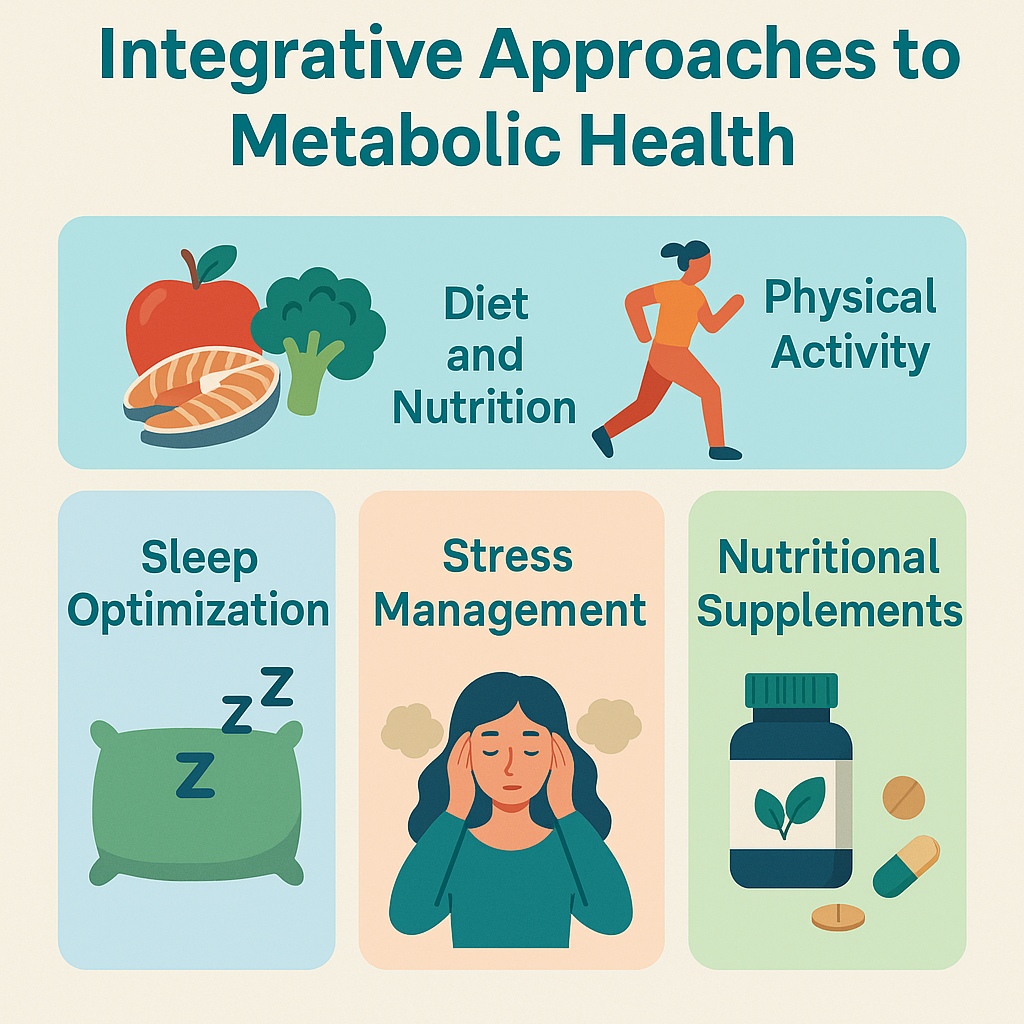Pillars of Metabolic Health
- Nourish Your Body for Metabolic Health and Balance
Food is powerful and drives your body’s processes and impacts Metabolic Health. The nutrients you eat directly shape how your metabolism performs. The goal isn’t perfection — it’s balance. A strong metabolism thrives on whole, colorful and clean organic foods that fuel your cells and mitochondria, stabilize blood sugar throughout your day, and reduce inflammation for effective and efficient operations.
Understanding your metabolism is a core principle in your health. What are your strengths and weaknesses, what are your root causes of health problems, both of which can drive a better plan to thrive. If you don’t look you won’t know. Information effectively drives good health and planning.
What to Focus On:
- Eat whole, unprocessed foods: Fresh vegetables, berries, clean proteins, and healthy fats (like olive oil, avocados, and nuts).
- Cut back on ultra-processed foods: Packaged snacks, sugary drinks, and fast food make blood sugar and hormones unstable and less effective.
- Balance your plate: Aim for fiber, protein, and healthy clean fats at every meal to stay full and energized.
- Try time-restricted eating: Giving your body breaks and rest from eating (such as a 12-hour overnight fast) helps your cells repair and improves insulin sensitivity.
🩺 Tip: If you struggle with cravings, fatigue, or blood sugar dips and peaks, ask your provider about personalized nutrition plans or metabolic testing to identify the problem as well put a plan in place to help your body do better.
- Move Often — Exercise Is Metabolic Medicine
Movement isn’t just about burning calories — it’s about signaling your body to heal and regenerate. Regular physical activity improves blood sugar control, builds muscle, regulates hormones, and strengthens the heart and mitochondria (your energy factories).
What Works Best:
- Resistance training (like weights or bodyweight exercises) builds lean muscle — a key tool for burning more energy even at rest.
- Aerobic exercise (walking, swimming, biking) supports your heart and helps your body use fat for fuel.
- Stay active throughout the day: Take stairs, stretch, or stand periodically — small movements matter.
🏃 Start small. Even 10 minutes after meals can help control blood sugar levels.
- Heal Your Gut Microbiome — The Hidden Key to Metabolic Health
Your gut microbiome — the trillions of bacteria living in your digestive tract — plays a huge role in metabolism, immunity, and inflammation. When your gut is out of balance, it can lead to bloating, cravings, and blood sugar spikes.
How to Support Gut Health:
- Eat fiber-rich foods: Beans, berries, and vegetables feed healthy gut bacteria.
- Add fermented foods: kimchi and sauerkraut can help maintain balance.
- Limit artificial sweeteners and excess antibiotics, which can disrupt your gut environment.
- Stay hydrated to keep digestion and detoxification running smoothly.
🦠 Remember: A healthy gut helps control inflammation — and inflammation drives many metabolic problems, from weight gain to fatigue to chronic illnesses.
- Prioritize Sleep — Your Nighttime Metabolic Reset
Good sleep isn’t just rest — it’s your body’s metabolic repair time. While you sleep, your brain clears toxins, hormones rebalance, and your cells restore energy.
When you don’t sleep well, stress hormones like cortisol rise, and hunger hormones (ghrelin and leptin) get out of balance, making it easier to gain weight and crave sugar.
How to Improve Sleep:
- Go to bed and wake up at the same time every day.
- Keep your bedroom dark, cool, and quiet.
- Turn off screens at least an hour before bed — blue light blocks melatonin, your sleep hormone.
- Avoid eating right before bed to support digestion and blood sugar control.
🌙 Aim for 7–9 hours per night — your metabolism will thank you.
- Manage Stress and Balance Your Hormones
Chronic stress silently undermines your metabolic health. When you’re stressed, your body releases cortisol, a hormone that increases blood sugar and appetite. Over time, this can lead to weight gain, especially around the belly, and even insulin resistance.
Healthy Ways to Reduce Stress:
- Lifestyle Changes, Mindfulness or meditation: Just 10 minutes a day can calm your nervous system.
- Breathing exercises: Try deep, slow belly breaths to lower cortisol instantly.
- Move mindfully: stretching, walking or tai chi relax the body and improve blood flow.
- Connect and unplug: Healthy social support is one of the most powerful metabolic protectors.
🌿 Adaptogenic herbs (like ashwagandha or rhodiola) may also support stress resilience — ask your healthcare provider before adding supplements.
Bringing It All Together: Your Metabolic Health Plan
Metabolic health is not about perfection — it’s about small, consistent choices that help your body heal naturally. When you eat real food, move your body, sleep deeply, and manage stress, your metabolism works for you, not against you.
Start where you are:
- Swap sugary snacks for berries and nuts.
- Add a 15-minute walk after meals.
- Go to bed 30 minutes earlier.
- Take a few deep breaths before reacting to stress.
Over time, these habits retrain your metabolism and support healthy energy, mood, and weight.
The Integrative Medicine Perspective
In integrative medicine, we look at the body as one connected system — not separate parts. When your metabolism is balanced, your brain, hormones, heart, and immune system all function better.
If you’ve been told your blood sugar, cholesterol, or blood pressure are “a little high,” don’t wait, change it. Your body has incredible power — with the right support, it can recover metabolic balance naturally.

